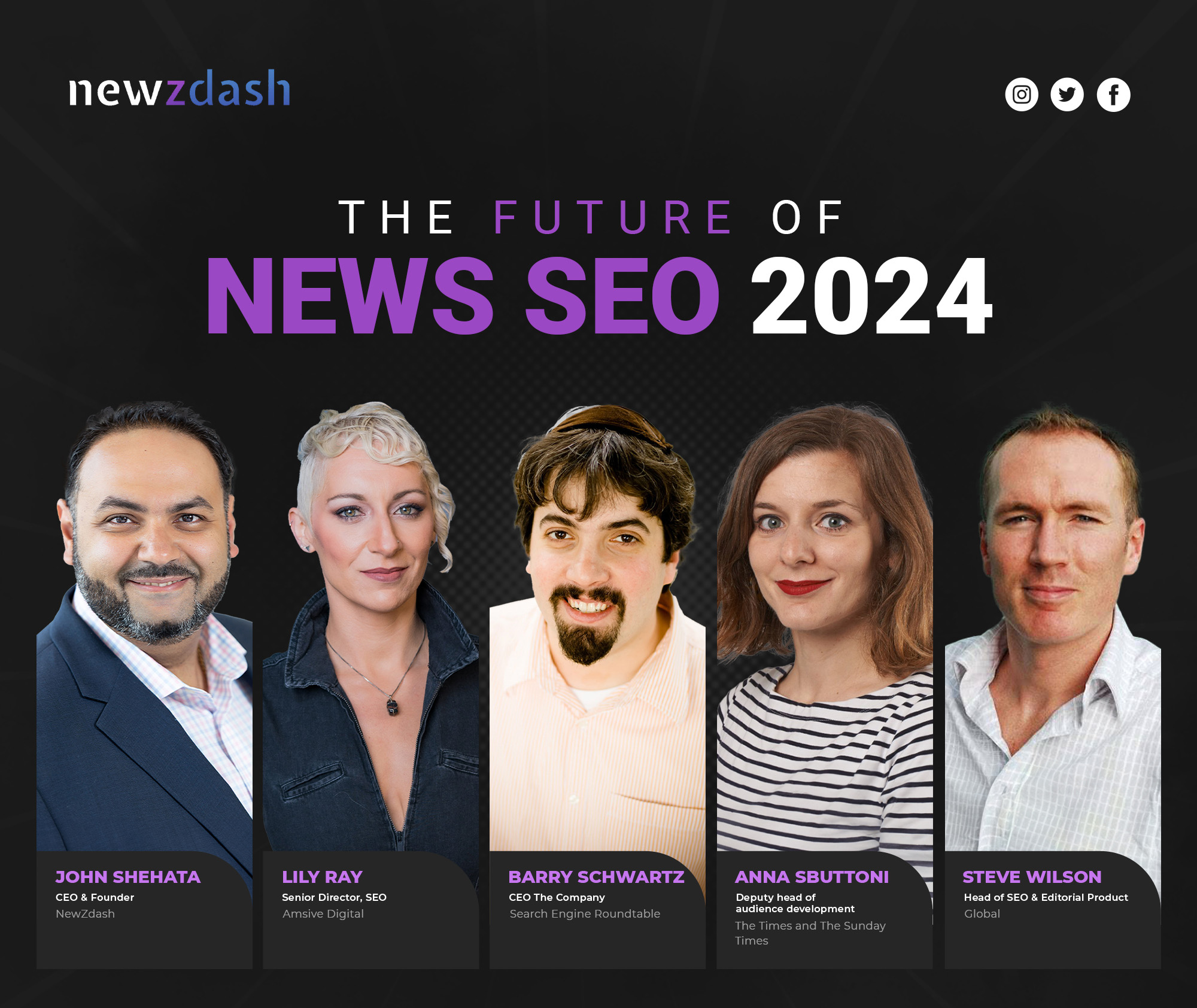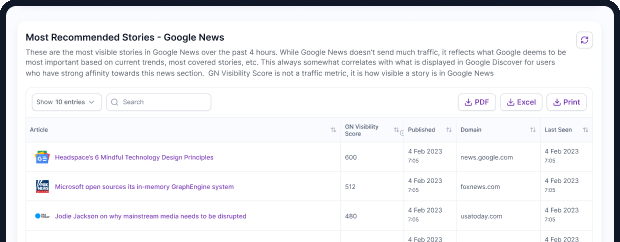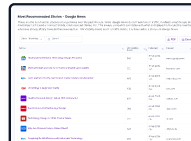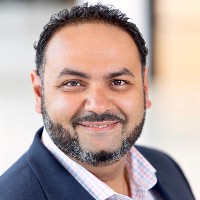The Future of News SEO 2024 Webinar - Full Video

Panel:
-
John Shehata: CEO & Founder @ NewZdash
-
Lily Ray: Senior Director, SEO @ Amsive Digital
-
Barry Schwartz: founder @ Search Engine Roundtable
-
Anna Sbuttoni: Deputy head of audience development @ The Times and The Sunday Times
-
Steve Wilson – Beales: Head of SEO & Editorial Product @ Global
Video:
Full Interview:
Welcome and Panelist Introductions
John Shehata: Welcome to our very first webinar of 2024. We have an amazing panel here with me today. So, let's get to know them very quickly. We have Barry, Steve, Anna and Lily, and I will let them introduce themselves. So, I'm going to start with the first one on my screen.
Barry, can you please introduce yourself?
Barry Schwartz: Hey, John. Thanks for having me. I'm Barry Schwartz. I write a lot about SEO. I've been doing that for over 20 years now. And I ran Search Engine Land and Search Engine Roundtable. I also have a company called Rusty Brick where we do software development, nothing related to SEO at all. So I talk the talk, but I don't walk the walk.
John Shehata: And, I call Barry our own archives of SEO. Like usually if I need to find something, I go check SEO, Search Engine Roundtable to find, did it ever happen before? So nice to have you, Barry.
Steve. Can you please introduce yourself?
Steve Wilson-Beales: I'm Steve Wilson-Beales. I'm the head of SEO and editorial product at Global. We're the biggest commercial radio group in the UK, expanding out into all forms of media and entertainment. So for example, we've invested a lot over the years in podcasts and we've got a number one news podcast at the moment, The News Agents, and then expanding into different brands like PopBuzz, etc. And my role is to be the Google man within Global, and also I advise on the build of our own in-house content management system. So, a lot of technical SEO in that side. So, it'd be good to speak with you today.
Anna Sbuttoni: Hi, so I'm Anna Sbuttoni, Deputy Head of Audience Development at The Times and The Sunday Times. So, my role is really to get our journalism out as far and as wide as possible, but also to factor in engagement every step of the way. Obviously with the subscription model, people are paying £26 a month for our journalism. We need to make sure it all
Lily Ray: I'm Lily Ray. I'm the senior director of SEO and head of organic research at Amsa based in New York City. And I oversee a 35 person SEO team and we're highly focused on news and discovery as well. So, I'm super happy to be here.
John Shehata: I'm John Shehata. I'm the CEO and founder of NewzDash. And in a former life, I was the global VP of audience development strategy for Condé Nast. So I have been working on the publisher side for about 25 years, until I decided to move more into the tools and the consulting side.
So, today guys, it's going to be a very interactive session. So, let's start with the elephant in the room - SGE. Is it a traffic killer? Will Google ever get it out of the experiment phase? Should we be worried that much?
SGE Concerns
Anna Sbuttoni: Well, thanks, John. I wish I had a crystal ball. I think ahead to SGE arriving in the UK, I just think it's made the audience team, and by extension the newsroom, really focus back on what our priorities are and what's going to make us different and what’s how we're going to add value to our content and make us stand apart.
So that's something that regardless of what happens with the rollout or how much it kinds of eats into news consumption via Google - that's something that I think at any point is best practice and something that we should be focusing on - making sure that we are really true to our expertise, authoritativeness, trust - you know, all those key elements that we already know about, but I just think it's really time to focus and just ask those hard questions. You know, the SEO team makes a pitch - it's always like, second guess it, ask more of it, set the bar really high.
Steve Wilson-Beales: Yes, I agree. I think there's going to be a common theme here - we need to address the audience needs model and talk to editorial teams and get data analysts involved. I've already communicated to senior leadership that this is a risk - we don't know when it's going to drop here in the UK or how it's going to roll out. My gut feeling is that when it does roll out, it’s probably going to hit publishers hard before it gets better. On that note, as Anna says, it is time to work out how to adjust, but also more importantly, understand the distinct offering you have for your audience.
Lily Ray: My perspective has changed. I think Barry and myself were pretty obsessed with SGE day to day last year, and all the ways it was changing. But my view changed - I have skepticism about feasibility for Google given risks around accuracy, publisher relationships and most importantly, profitability. I don't see how Google can make this profitable, which is most important. So I don't know if fundamental issues have been resolved, and actually it seems Google is now starting to trend towards "we can do cool things with AI, but SGE is a background thing."
So it’s hard to plan for something uncertain. But depending on your content and business model, it’s important to be in Google Labs, test SGE, and see how Google sources information in SGE to structure content better to answer user questions.
Barry Schwartz: I think the question is will Google ever launch this fully? I think they have it in their back pocket in case needed - like if stock price depended on it, they'd launch today.
SGE Impact on Content Types
John Shehata: Let's assume Google launches this. Do you think the impact on different types of content - evergreen, news, affiliate - will be the same?
Anna Sbuttoni: I don't think it will be the same. From what I’ve seen, there’s more competition on evergreen side - “best X” type queries where the generative results can seem more useful. Obviously with breaking news, there may be value in commentary pieces reacting to something happening. So I feel more concerned about evergreen in terms of planning - that’s where we may need to revise more radically.
Steve Wilson-Beales: Anything that AI can do, where you're not adding distinction, is a threat. This is another reminder that we need to push towards original journalism rather than replicate competitors. There’s still replication out there that AI can easily replicate.
Barry Schwartz: It depends on the topic - some just have a smaller following than others in Discover. I wouldn't be discouraged if certain topics don't show up much in Discover.
John Shehata: Commerce and affiliate content is very dependent on Google now for revenue. If SGE shows recommendations directly to Google Shopping for product reviews and takes that middleman away, publishers lose incentive to create reviews. What do you think?
Lily Ray: It's beyond a catch 22, it’s an existential threat for that business model which we already see from the reviews update. Traffic isn't coming back for those sites. What’s aggravating is Google pushed high E-A-T product reviews then repurposed info into SGE and Google Shopping, which feels unfair. It’s hard to console those clients, but hopefully Google uses 2024 updates to give visibility back to these sites rather than stealing their traffic.
Barry Schwartz: SGE seems to pull from lower quality sites than before. Google shopping is basically an Amazon catalog now. I think incorporating shopping is how Google is monetizing SGE results by putting product ads everywhere. I think it’s in beta and Google wants the best content to produce the best results. Recent months have had embarrassing updates but I expect surprises in the next update.
Anna Sbuttoni: We have a travel section with high quality journalism and reviews that subscribers value. But discovering that content algorithmically is a question mark given the AI summarization. So to be continued, but we view Discover traffic as bonus traffic given the volatility.
John Shehata: My analysis of 900 billion Discover impressions shows 80-90% is news, not evergreen. Evergreen appears when search history triggers it. "News evergreen" content like "Top 10 Netflix movies this week" can keep appearing with constant refreshes.
SGE Launch Concerns
John Shehata: Simple yes or no - is SGE ready to launch fully now?
Anna Sbuttoni: I think the reason it hasn’t launched in the UK is because it's not ready. The delay indicates what’s happening.
Lily Ray: No.
Steve Wilson-Beales: No, but we haven't seen the UK version yet which will show precise details on quality.
Barry Schwartz: It doesn’t matter if it’s ready or not, Google will launch eventually. You have to launch at some point, even if it’s not perfect. But I'm not surprised it hasn’t fully launched yet.
Using AI in Newsrooms
John Shehata: Let's move on. Should newsrooms embrace AI? What are the best use cases?
Steve Wilson-Beales: Absolutely embrace it for help getting deeper into stories and supporting journalists by automating admin tasks. Some newsrooms are creating AI specialist roles to lead this because it’s extremely hard to cover news and learn AI. For smaller newsrooms, we'll rely heavily on expertise to help guide AI usage, which has incredible potential around examining data and visualizations to tell impactful stories.
Anna Sbuttoni: Yes, we have a small cross-functional working group experimenting with AI uses in the newsroom and testing concepts. There’s content creation, which is human journalists doing high value reporting, but also curation, tagging, data analytics to speed things up and spot trends and make decisions faster. We have some beta models rolling out to test more widely soon. It’s an active discussion with editorial involvement.
SEO Uses of AI
John Shehata: How should news SEOs utilize AI?
Lily Ray: So many opportunities! I spend all day in ChatGPT doing everything - it’s a great assistant to upload files and data to interpret and provide insights. You have to be careful about publishing whatever it says, but it’s essential for quick analysis.
Barry Schwartz: I write a lot and try to use AI to improve content but it tends to add fluff and unnecessary words. I don’t find it useful for my niche, specialized content. But it’s amazing for generating images that you can’t get otherwise. It’s also very useful for specific SEO tasks like data analysis, especially for generalist writers having to explain basic concepts - but for niche content, it doesn’t really help me so I mostly use it for images.
Future SEO Challenges
John Shehata: Okay, news SEO 2024 - what are the biggest challenges coming up and how to solve them?
Steve Wilson-Beales: We're at a crux point with disappearing organic search and social media traffic. Now is when we need to allocate more time to audience needs models - re-evaluating who our audiences are, what they want beyond breaking news, and how we can cater to them across formats. There’s increasing news avoidance so this speaks to fundamental existential things around news being depressing and constant. People want a break. So this is a branding and proposition problem - we need to highlight what makes our journalism worthwhile through transparency and simplifying complex details.
Anna Sbuttoni: Despite volatility, we can't discard SEO influence. We need to show worth in the newsroom through broader digital understanding. I think SEO and audience contributions editorially are really important and that will be a 2024 mission - keep asking what value we're adding with each news story package.
Lily Ray: The last few months have been very difficult for news publishers with massive October changes, particularly in Discover. Hopefully that rights itself because losing all Discover traffic with no understanding why is hard to deal with. I wouldn't dramatically change anything - this seems to be a Google issue to resolve. One positive glimmer of hope is testing Discover on desktop, which would massively benefit news if launched.
Barry Schwartz: The biggest threat is AI taking jobs, which affects writers, SEOs and more. Every big company wants to replace people with tech. Specialization is key - AI can mimic specialists but true experts can identify flaws. So new people will struggle unless they specialize quickly, but maybe I'm wrong and we'll just watch movies all day in the future while AI does everything!
John Shehata: Diversification is key with so much dependence on Google traffic. News organizations need a holistic audience portfolio with non-Google referrals like newsletters and apps.
Experience-Led Content
John Shehata: Should newsrooms focus heavily on experience-led content this year?
Anna Sbuttoni: Regardless of Google, it gets high engagement. Our subscribers consume it eagerly. It's best practice off-platform and subscribers love it. So I’m happy to keep pushing more personal perspectives to elevate any content.
Steve Wilson-Beales: Yes, we’ll be advising teams to put more personality into work, although it may be difficult to differentiate from AI. Experiential journalism highlights the value.
Lily Ray: Yes, it follows Internet trends of audiences wanting to follow specific personalities and voices that resonate for certain topics.
Perspectives Feature
John Shehata: What’s going on with Google Perspectives?
Barry Schwartz: There’s boxes within search results that summarize content from elsewhere - not sure how much engagement they get. And there’s a Perspectives filter that shows up sometimes too. This seems like a short-term test feature that will go away so should take advantage of it while we can, like we did with AMP.
In order to distribute content widely like Perspectives does, publishers should distribute everywhere - Reddit, Twitter, etc.
John Shehata: My analysis showed Perspectives sources were 34% Twitter posts, then 24% YouTube videos, then 17% Reddit posts.
Anna Sbuttoni: We’re discussing Perspectives more holistically about tailoring packaged content around news stories - main news story plus analysis piece plus opinion piece, structuring it for specific user needs. Haven’t seen much referral traffic but it’s made us think more concertedly about purposes of different pieces.
Steve Wilson-Beales: We haven’t seen spikes from Perspectives but have invested more in video content to take advantage of that area.
Lily Ray: I don’t see the filter often. For news publishers, it’s about highlighting individual experts that may appear there by showcasing personality and perspectives.
Assessing Content Quality
John Shehata: Does Google understand quality and helpfulness of content or just user signals?
Steve Wilson-Beales: Google struggles to ID helpful content but we should still aim to create it based on journalism standards and the helpful content guidelines. But basics like internal linking and site architecture are extremely important for Google to understand the content.
Barry Schwartz: I think Google thinks they understand quality/helpfulness - that was the purpose of the helpful content updates. But the first couple didn’t do anything and the latest one made big mistakes according to complaining site owners who feel personally attacked when their sites tanked. That’s why there hasn’t been another update in awhile. Just focus on users regardless of Google.
Anna Sbuttoni: We’ve worked to shift away from “good SEO content” and focus on “good digital content” more broadly like good stories, headlines, user engagement. Those are our priorities.
Lily Ray: Hyper focusing on Google’s abilities isn’t great. From consulting companies affected by the helpful update there seem to be clear patterns in what was penalized that could reduce user frustration in the future. Google users feel there’s too much SEO in content sometimes. Use this to check that your content sounds more human - focus on resonating with users rather than pleasing Google.
Final Words of Advice
John Shehata: We’re at the end - one piece of 2024 advice to leave attendees with?
Steve Wilson-Beales: What Google giveth it can taketh away. Know your audience.
Anna Sbuttoni: SEOs can show worth in newsrooms through broader digital understanding. Contributions editorially will be key.
Lily Ray: Make more videos - upload to YouTube. That’s where traffic and visibility is.
Barry Schwartz: Build content that if Google doesn’t rank well, they’d be embarrassed not to rank given the quality. Easier said than done!
John Shehata: Google sometimes gets it wrong so don’t freak out. Just focus on great content for your audience. Happy 2024!
























